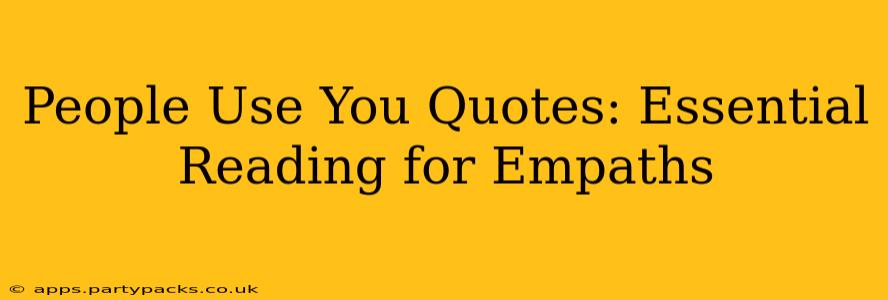Empaths, with their heightened sensitivity and ability to deeply feel the emotions of others, often find themselves targets of manipulation and emotional exploitation. Understanding the dynamics of such relationships is crucial for self-preservation and healthy boundary setting. While there's no single magic bullet, recognizing the patterns and learning to identify manipulative behaviors is a significant step towards empowerment. This article explores insightful quotes that resonate with the experiences of empaths, providing valuable perspectives on navigating these challenging interpersonal dynamics. We'll also address some frequently asked questions regarding empathic relationships and self-protection.
What are some quotes that resonate with empaths who feel used?
Many quotes capture the feeling of being used, particularly for those with highly sensitive natures. These often center around themes of betrayal, exhaustion, and the subtle ways manipulation can manifest. Here are a few examples:
-
"The most painful thing is losing yourself in the process of loving someone too much, and forgetting that you are special too." This quote highlights the self-sacrifice that can accompany empathic relationships. The tendency to prioritize others' needs above one's own can lead to a depletion of self-worth and emotional resources.
-
"Kindness is a gift, but don't let people take advantage of your generosity." This acts as a crucial reminder that empathy and kindness shouldn't be mistaken for weakness or an invitation for exploitation. Setting healthy boundaries is essential for preserving one's emotional well-being.
-
"It's better to be alone than to be with someone who makes you feel alone." This speaks to the isolating nature of relationships where an empath feels unseen, unheard, and ultimately used. The loneliness stems not from solitude but from a lack of genuine connection.
How can I tell if someone is using me?
Identifying manipulative behavior can be tricky, especially for empaths who are naturally inclined to trust and forgive. However, certain red flags should raise concerns:
-
One-sided relationships: Do you consistently give more than you receive? Is the relationship largely about the other person's needs, leaving yours unmet?
-
Emotional manipulation: Does the person guilt-trip, gaslight, or otherwise manipulate your emotions to get what they want?
-
Lack of reciprocity: Do they only contact you when they need something? Do they offer little to no support or understanding in return?
-
Disregard for your boundaries: Do they consistently ignore or push against your limits, even after you've clearly communicated them?
If you notice a pattern of these behaviors, it's a strong indicator that the relationship may be unbalanced and potentially exploitative.
How do I stop people from using me?
Protecting yourself from manipulation requires a multifaceted approach:
-
Set clear boundaries: Communicate your limits clearly and assertively. Don't be afraid to say no.
-
Prioritize self-care: Empaths often neglect their own needs. Make time for activities that nourish your physical, mental, and emotional well-being.
-
Develop emotional intelligence: Understanding your own emotional responses and triggers allows you to better recognize and respond to manipulative tactics.
-
Practice self-compassion: Be kind to yourself and acknowledge your feelings. Don't blame yourself for others' actions.
-
Seek support: Talking to a therapist or trusted friend can provide valuable perspective and support.
What are some good coping mechanisms for empaths who feel used?
Coping mechanisms are crucial for healing and preventing future exploitation:
-
Journaling: Writing down your thoughts and feelings can help you process your experiences and identify patterns.
-
Meditation and mindfulness: These practices can help you become more aware of your emotions and develop emotional regulation skills.
-
Spending time in nature: Nature provides a grounding and calming effect, helping to reduce stress and anxiety.
-
Engaging in creative activities: Expressing yourself through art, music, or writing can be cathartic and healing.
By understanding these patterns, setting healthy boundaries, and prioritizing self-care, empaths can navigate interpersonal relationships with greater confidence and self-preservation. Remember, your empathy is a strength, not a weakness. Learning to protect its energy is key to a fulfilling and empowered life.

